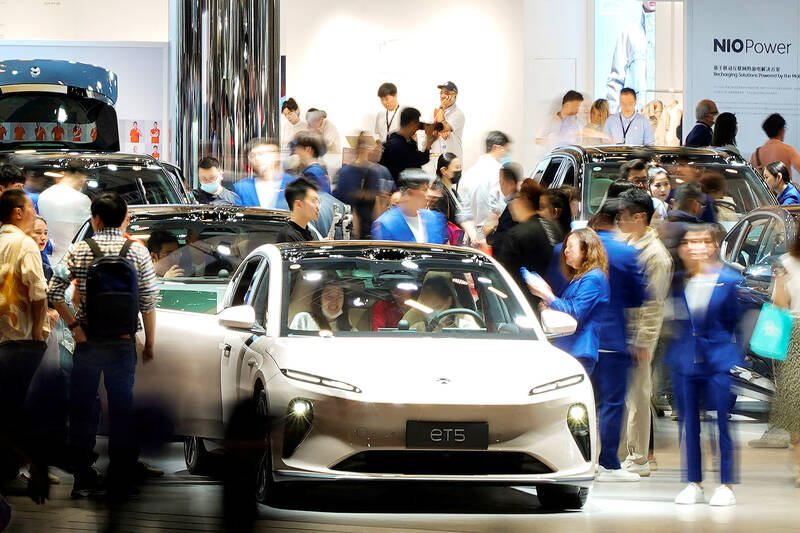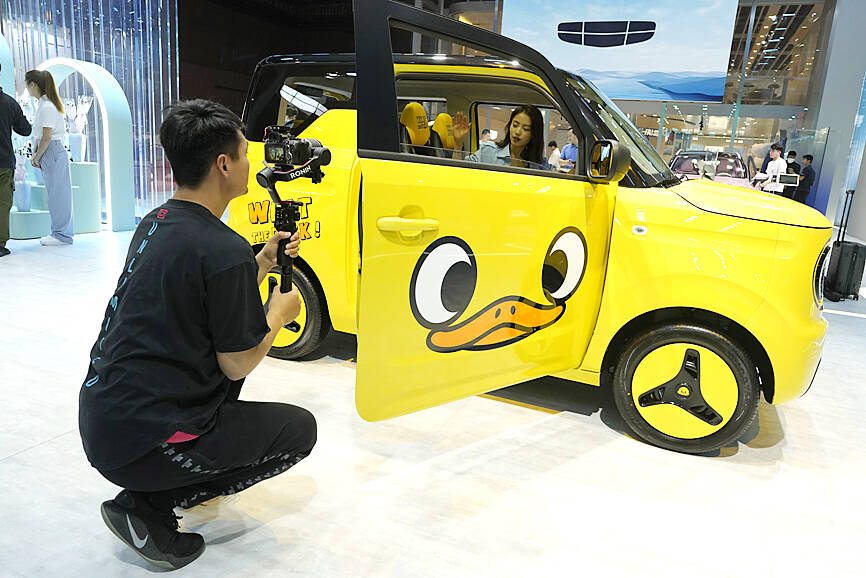This year’s Auto Shanghai show signaled the end of the internal combustion engine era in China, as domestic electric vehicle (EV) brands drive change across the sector and leave foreign companies in the dust, analysts and industry insiders said.
Government support for EVs and growing interest from a vast consumer base has assured Chinese companies’ dominance of their home market, the world’s largest — and they are now beginning to set their sights overseas.
Shanghai has shown that Chinese brands “can compete with all of the legacy automakers in every way — performance, quality, comfort, there’s nothing they can’t do,” EV specialist Elliot Richards said, jokingly adding that he had seen “a lot of worried-looking German men wandering around.”

Photo: Reuters
“I think this show marks the end of the internal combustion engine and the beginning of the EV era,” he said.
EV companies are well aware that they are closing in on their fossil-fueled predecessors.
“We regard high-end petrol vehicles such as Mercedes-Benz, BMW and Audi as our main competitors,” said William Li (李斌), CEO of the “Chinese Tesla” Nio Inc (蔚來汽車).

Photo: AP
EVs last year made up one-quarter of vehicle sales in the country, a year-on-year increase of 94 percent, the China Association of Automobile Manufacturers said.
CHINA BOOM
Despite a downturn across the global auto sector, Li said he thought that the market share of EVs in China could increase to more than 40 percent this year.
In Shanghai, dozens of new models were on display from new and legacy automakers alike.
“The future is very much here now,” said Mike Johnstone, vice president, commercial at Lotus Cars Ltd.
“There’s a lot of proliferation of electrified products [in China], and it’s changing the entire market,” he said.
‘HEAD START’
China has dedicated huge resources to the industry.
“They skipped developing petrol engines, because they can’t compete with the rest of the world,” Richards said. “So they thought: ‘[With EVs] we can get a head start in front of everyone else.’”
The country began investing heavily in associated technology from the early 2000s.
“It’s ingrained in the nature of the country’s economic system: The Chinese government is very good at focusing resources on the industries it wants to grow,” journalist Zeyi Yang wrote in the MIT Technology Review.
Central and local authorities have poured billions of US dollars into subsidies and tax breaks, and allocated public transport contracts to EV companies.
The supporting infrastructure was built too; the government says there are now more than 5.8 million charging piles in China.
Guangdong Province alone has about three times as many public chargers as the whole of the US, Bloomberg data showed.
“In general, there are still a lot of preferential policies ... for the production and sale of electric vehicles,” said Li, using as an example the waiving of expensive license plate fees in some cities.
Those policies have applied to foreign brands, too. That tactic helped lure industry leader Tesla Inc to Chinese shores, bolstering the sector’s reputation and sparking further competition.
Nowadays, more than 94 brands offer more than 300 models in the Chinese market — “the most vibrant globally,” Counterpoint Research says.
COST MATTERS
Some are smashing the cash barrier that put EVs beyond the means of the average consumer. In Shanghai, China’s Geely Holding Group Co (吉利控股集團) exhibited its boxy Panda Mini — including a bright yellow one with the phrase “What the duck” emblazoned on its side. The cheaper versions cost about US$5,800.
Homegrown technology could drive prices down even further. Battery giant Contemporary Amperex Technology Co Ltd (CATL, 寧德時代新) has developed a cell that uses sodium instead of lithium ions, the former both more abundant and cheaper than the latter.
Just before the show opened, CATL announced those batteries would be incorporated into Chery Automobile Co Ltd’s (奇瑞汽車) vehicles.
RIPPLE OVERSEAS
All this is being watched closely by foreign competitors.
Brands within the Chinese market are “setting the benchmark now” for others, Johnstone said.
Chinese EV companies have already begun to make inroads abroad. The biggest of them, BYD Co (比亞迪), set up shop in Norway then expanded onward, and others are following.
The technological sophistication of Chinese-made EVs is combating old stereotypes around quality that foreign consumers might harbor, Zeekr Intelligent Technology Co (極氪智能) Europe CEO Spiros Fotinos said.
“Consumers are seeing a lot of innovative safety technologies, with driver assist systems that are really cutting edge,” he said.
NOT A SURE THING
However, Richards said that Chinese automakers’ success in the West is not “a done deal,” as they would have to adapt to the market.
“Karaoke machines in cars, for example — very popular in China, not so popular in Europe,” he said.
Johnstone said automakers with “heritage and history” that welcomed in the electric era would remain competitive.
“Brands that have been around for a number of years ... will continue to live in the future as well,” he said.

PROTECTION: The investigation, which takes aim at exporters such as Canada, Germany and Brazil, came days after Trump unveiled tariff hikes on steel and aluminum products US President Donald Trump on Saturday ordered a probe into potential tariffs on lumber imports — a move threatening to stoke trade tensions — while also pushing for a domestic supply boost. Trump signed an executive order instructing US Secretary of Commerce Howard Lutnick to begin an investigation “to determine the effects on the national security of imports of timber, lumber and their derivative products.” The study might result in new tariffs being imposed, which would pile on top of existing levies. The investigation takes aim at exporters like Canada, Germany and Brazil, with White House officials earlier accusing these economies of

EARLY TALKS: Measures under consideration include convincing allies to match US curbs, further restricting exports of AI chips or GPUs, and blocking Chinese investments US President Donald Trump’s administration is sketching out tougher versions of US semiconductor curbs and pressuring key allies to escalate their restrictions on China’s chip industry, an early indication the new US president plans to expand efforts that began under former US president Joe Biden to limit Beijing’s technological prowess. Trump officials recently met with their Japanese and Dutch counterparts about restricting Tokyo Electron Ltd and ASML Holding NV engineers from maintaining semiconductor gear in China, people familiar with the matter said. The aim, which was also a priority for Biden, is to see key allies match China curbs the US

Teleperformance SE, the largest call-center operator in the world, is rolling out an artificial intelligence (AI) system that softens English-speaking Indian workers’ accents in real time in a move the company claims would make them more understandable. The technology, called accent translation, coupled with background noise cancelation, is being deployed in call centers in India, where workers provide customer support to some of Teleperformance’s international clients. The company provides outsourced customer support and content moderation to global companies including Apple Inc, ByteDance Ltd’s (字節跳動) TikTok and Samsung Electronics Co Ltd. “When you have an Indian agent on the line, sometimes it’s hard

‘SACRED MOUNTAIN’: The chipmaker can form joint ventures abroad, except in China, but like other firms, it needs government approval for large investments Taiwan Semiconductor Manufacturing Co (TSMC, 台積電) needs government permission for any overseas joint ventures (JVs), but there are no restrictions on making the most advanced chips overseas other than for China, Minister of Economic Affairs J.W. Kuo (郭智輝) said yesterday. US media have said that TSMC, the world’s largest contract chipmaker and a major supplier to companies such as Apple Inc and Nvidia Corp, has been in talks for a stake in Intel Corp. Neither company has confirmed the talks, but US President Donald Trump has accused Taiwan of taking away the US’ semiconductor business and said he wants the industry back